Coordinación
Una coordinación sólida puede evitar vacíos y duplicaciones en las respuestas humanitarias, así como garantizar que los PTM complementen otros tipos de asistencia. Sin embargo, el informe del «Estado Global de los Programas de Transferencias Monetarias» de la CALP Network muestra que la coordinación de la asistencia en efectivo es vista como débil y ad hoc, y que esto está teniendo graves repercusiones operativas.
Los donantes, las ONG y los líderes de los grupos de trabajo de transferencias monetarias (GTM) han pedido claridad sobre tres temas principales relacionados con la coordinación de la asistencia en efectivo:
- Quién debe ser responsable de asegurar una coordinación eficaz de la asistencia en efectivo;
- Cuál es la función y el mandato de los grupos de trabajo de transferencias monetarias, incluso en relación con las transferencias monetarias multipropósito;
- Cómo se debe dotar de recursos a la coordinación de asistencia en efectivo.
Tenemos que basarnos urgentemente en lo que funciona y proporcionar claridad a nivel mundial sobre las preguntas arriba mencionadas, adaptándonos a los diferentes contextos. Hace mucho tiempo que se deberían haber tomado decisiones claras basadas en necesidades operativas y no en la política de las agencias.
Prioridades actuales
El objetivo de la CALP Network es contribuir a seguir progresando en este tema en tres niveles: apoyar a los grupos de trabajo de transferencias monetarias a nivel regional; contribuir a soluciones prácticas para la coordinación de la asistencia en efectivo a nivel mundial; y convocar una discusión basada en la evidencia sobre temas clave, destacando puntos de decisión críticos y oportunidades de progreso.
Contenido destacado

Cash Coordination Tip Sheet
Guidelines and Tools
This tip sheet sets out established best practice, key guidance and resources for all aspects of cash coordination, intended as a clear, accessible and action-oriented guide for those engaged in coordination of cash and voucher assistance (CVA) at the field level.

Introducing the Cash Coordination Tip Sheet
Webinar
The CALP Network has developed a tipsheet setting out established best practice and key guidance and resources for all aspects of cash coordination, intended as a clear, accessible and action-oriented guide for those engaged in coordination of cash and voucher assistance at the field level.

Cash Coordination: A proposal from members in MENA
Blog Post
Earlier this year the CALP Network undertook regional consultations to explore options for cash coordination. This blog lays out recommendations from participants from the Middle East and North Africa who sketched out what cash coordination, and coordination more broadly, could look like in future to support a more effective, efficient and accountable response.
Últimos recursos

Cash Consortium of Iraq (CCI)
Report
The Cash Consortium Iraq (CCI) was selected as a case study to illustrate a consortium model of inter-agency collaboration for multi-purpose cash assistance (MPCA), with a formal relationship between partners and a shared funding stream, both bilaterally to member agencies and through the lead agency. It...

Cash and Markets Monthly Dashboard DRAFT April 2017
Guidelines and Tools
• The cash and markets, monthly dashboard presents current data on market prices of key commodities and the cost of the minimum expenditure basked (MEB) across Somalia. In addition, it also provides key highlights relevant to cash and market interventions.
• Page one presents the cost of the food MEB...
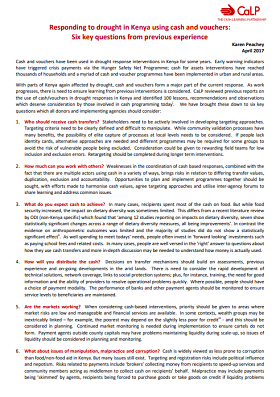
Responding to Drought in Kenya Using Cash and Vouchers: Six Key Questions from Previous Experience
Guidelines and Tools
the CALP Network reviewed previous reports on the use of cash/vouchers in drought responses in Kenya and identified 100 lessons, recommendations and observations which deserve consideration by those involved in cash programming today. We have brought these down to six key questions which all donors and...
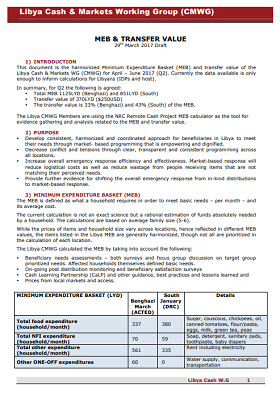
MEB and Transfer Value Guide
Guidelines and Tools
This document is the harmonized Minimum Expenditure Basket (MEB) and transfer value of the Libya Cash & Markets WG (CMWG) for April – June 2017 (Q2). Currently the data available is only enough to inform calculations for Libyans (IDPs and host).
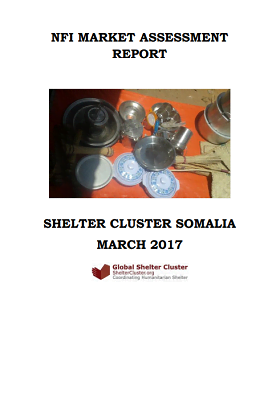
NFI Market Assessment Report – Somalia
Report
The Shelter Cluster, through its regional coordinators rolled out NFI market assessments in six towns including Mogadishu, Kismayo, Bossaso, Baidoa and Dobley through a rapid mobile technology based market survey tool. The purpose of the survey was to establish where NFI markets exist and what items are...
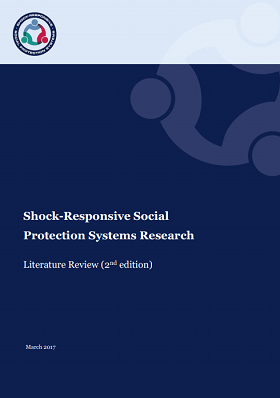
Shock-Responsive Social Protection Systems Research: Literature Review (2nd Edition)
Report
DFID has commissioned research into Shock-Responsive Social Protection systems, to further understand the nature of the interaction between social protection, humanitarian and disaster risk management systems and ways in which long-term social protection systems can be scaled up to provide support in...
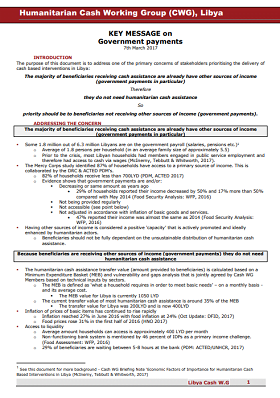
Libya Humanitarian Cash Working Group (CWG) Key Messages on Government Payments
Report
The purpose of this document is to address one of the primary concerns of stakeholders prioritising the delivery of cash based interventions in Libya:
The majority of beneficiaries receiving cash assistance are already have other sources of income (government payments in particular) Therefore they do not...

Geneva based Cash Working Group – Minutes – February 2017
Report
Geneva based Cash Working Group – Minutes – February 2017
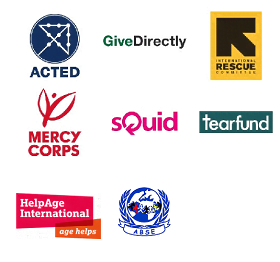
Press Release: Providing cash directly to those most in need is revolutionising the way we provide overseas aid to the world’s poorest people
Blog Post
London, United Kingdom – As the global partnership for cash transfer programming in humanitarian aid, the the CALP Network takes issue with recent criticisms of cash transfers made by Nigel Evans MP and in the media. Cash transfer programming is one of the most highly scrutinized forms of aid. The CALP...

Collecting Prices for Food Security Programming
Guidelines and Tools
As a contribution towards standardizing price data collection, this paper aims to explore the core issues related to setting up a price monitoring system, also in countries where no such system currently exists. It describes the factors a country office needs to consider when designing such a system,...

The use of CTP in Kenya: Reflecting on the 2016/17 Drought Response
Report
This workshop report is packed with useful ideas and information, reflecting the lively discussions which took place at a workshop in June 2017 about the use of CTP in the Kenya drought response. Discussions touched on multiple issues including coordination; cash transfer values; lack of awareness...

Cash Transfer Programming: Lessons from northern Iraq
Report
In situations of conflict, disaster and protracted crisis, displaced persons not only face physical threats but are also confronted with the challenge of economic survival. High levels of general unemployment or legal barriers to labour market entry often restrict access to jobs and income, and...
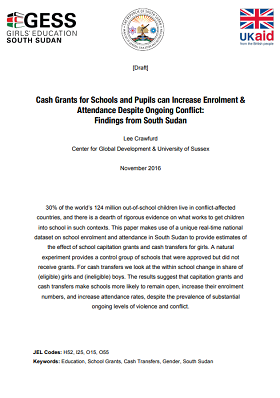
Cash Grants for Schools and Pupils can Increase Enrolment & Attendance Despite Ongoing Conflict: Findings from South Sudan
Report
This paper makes use of a unique, real-time national dataset on school enrolment and attendance in South Sudan to provide estimates of the effect of school capitation grants and cash transfers for girls.
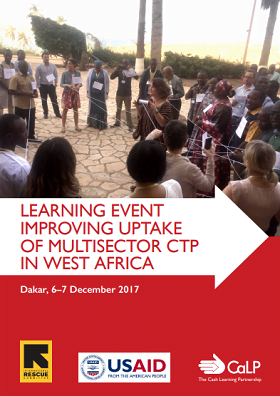
Improving Uptake of Multi-Sector CTP in West Africa: Learning Event Report
Report
In December 2017, the CALP Network and the IRC came together to organize a two-day learning event to align understanding and share experiences of countries working on the definition of Minimum Expenditure Baskets, and to contribute to bridging capacity gaps in Market Analysis, a critical step for CTP...

Community Based Targeting Report
Report
The current study aimed to gain a comprehensive understanding of SEV from the community’s perspective and to assess the targeting practices implemented by cash actors in Lebanon. It demonstrated that, according to the community, HH size had an impact on vulnerability, but that that depended on its...

Fitting aid to context: community experiences of aid delivery in northern Syria
Report
The ongoing conflict in Syria has left 13.5 million Syrians in need of humanitarian assistance. Several local and international organisations provide aid to northern Syria, but their chosen modalities fail to effectively meet community members’ needs. While aiming to respond to immediate short-term...
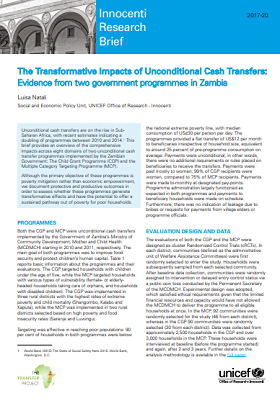
The Transformative Impacts of Unconditional Cash Transfers: Evidence from two government programmes in Zambia
Report
Unconditional cash transfers are on the rise in Sub-Saharan Africa, with recent estimates indicating a doubling of programmes between 2010 and 2014.This brief provides an overview of the comprehensive
impacts across eight domains of two unconditional cash transfer programmes implemented by the...

Scaling up CTP in Somalia: A focus on: CTP options in a changing funding landscape and Improving the use of lesson learning
Report
This report summarises discussions that took place during a half-day event in November 2017. The event built on discussions in September during which a myriad of issues were highlighted and many opportunities for collective action noted. This meeting focused on a more in-depth discussion on two issues...

Monitoring for MPGs: Nigeria
Guidelines and Tools
DRC partnered with graduate students from the Fletcher School at Tufts University, to design three quantitative and qualitative monitoring tools to gauge the effect of MPGs at household and community levels (namely household survey, key informant interview and community group discussion templates). This...

Can E-Transfers Promote Financial Inclusion in Emergencies: A Case Study from Ethiopia
Report
The Electronic Cash Transfer Learning Action Network (ELAN) launched this research to build an evidence base around connecting emergency electronic transfer (e-transfer) recipients with additional financial
services. They also wanted to learn if, when, and how e-transfers can promote sustained uptake and...